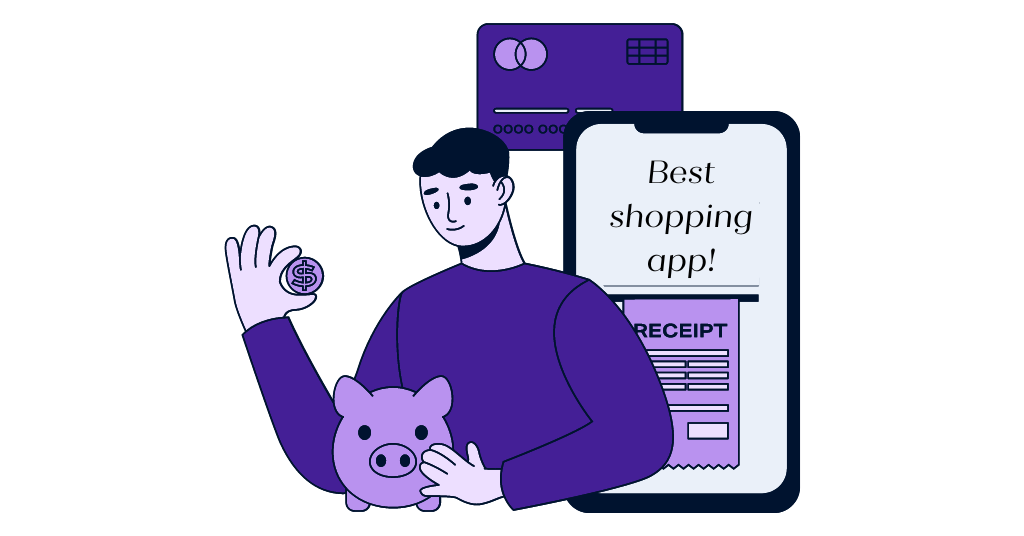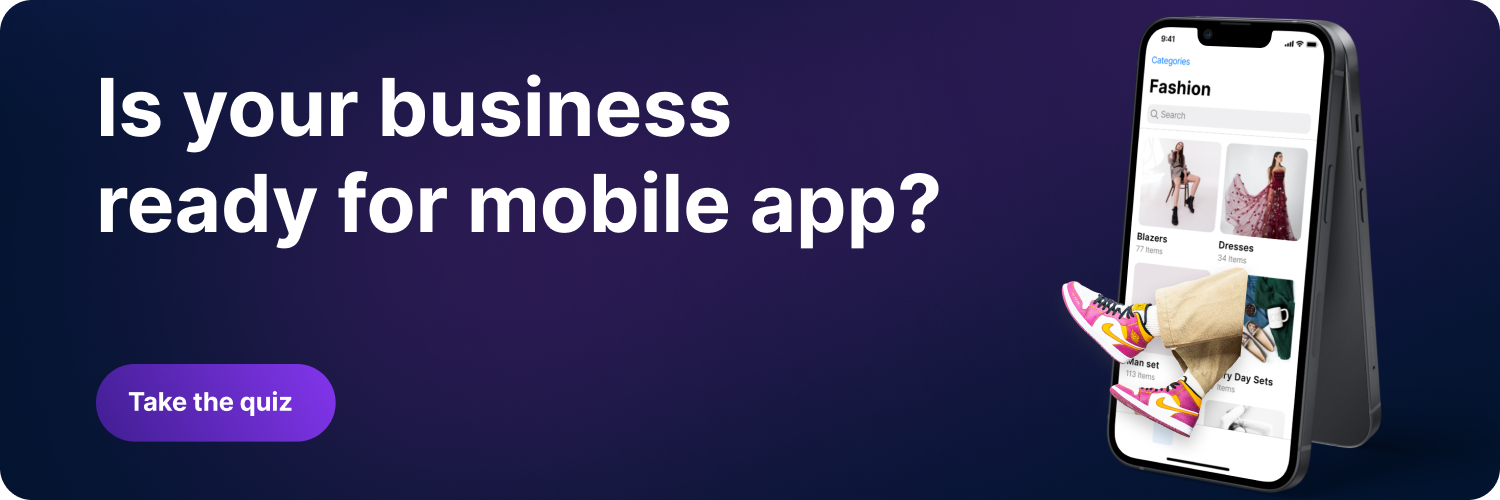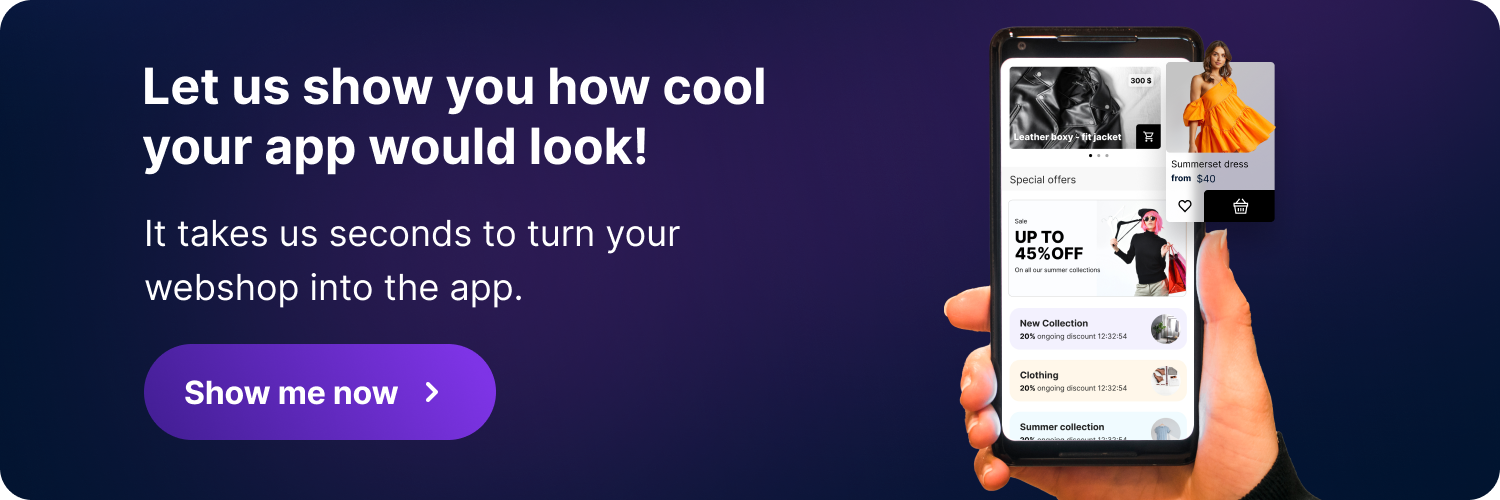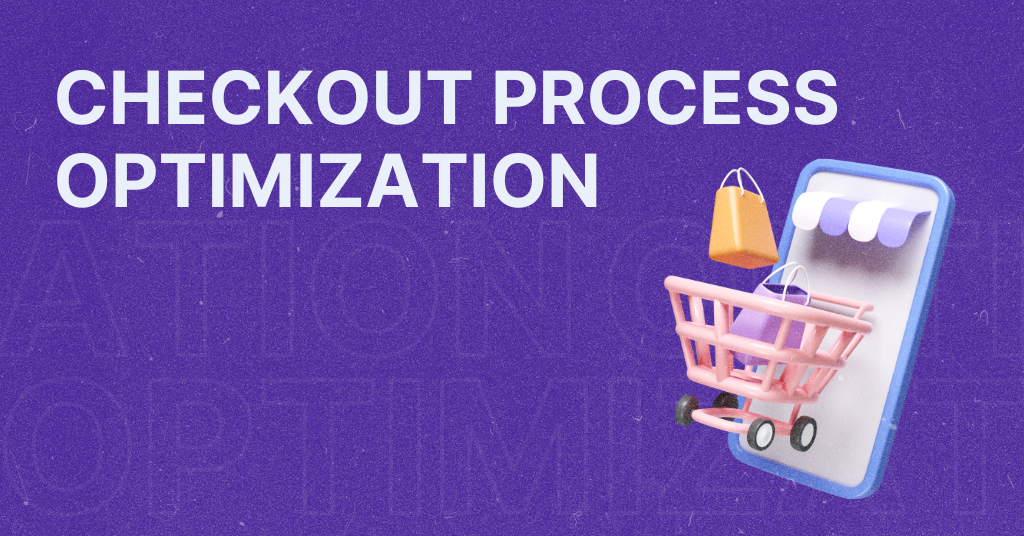
Mobile app for e-commerce: how to get a good one without breaking the bank
“I need a mobile app for my online store. A must-have is a mind-reading feature. That way, as a business owner, I could read customers’ minds. Apart from that minor functionality, I would need a holographic feature showing my products as soon as customers click on them. Oh, another thing, I need it in one day.”
Apart from exaggerating this example above, we’re at the center of similar events when we talk with potential clients. Being in the software industry allows us to listen to unique ideas. Many are awesome and achievable. But sometimes we’re the witnesses that the idea owners are not well informed about the whole process, like getting a mobile app.
Regarding developing mobile apps for e-commerce, two main issues are stopping many owners from getting one for their business. Both are connected to the cost of building a mobile app for e-commerce. One of the issues is that people often aren’t aware of the actual costs of specific functionalities and how long the developers need to build them. Another issue is related to prejudices. People who know more about costs often think that every mobile app solution costs a fortune, as some simple apps could cost more than 50 000 USD.
If you want to find out how much it will cost to get a mobile app for your e-commerce business, keep reading.
Is a mobile app for e-commerce necessary?
In e-commerce, staying competitive requires keeping up with the latest trends and technology. With the growing use of mobile devices, it’s no surprise that more and more businesses are considering a mobile app for their e-commerce store.
But is it worth the investment?
E-commerce refers to selling goods online but may have a higher purpose. Some businesses are building a brand.
The omnichannel approach is still a big deal
Our mobile app solution for online stores is not accidentally named OmniShop. The ‘omni’ stands for many things but also shows that a mobile app is part of an omnichannel approach. If you’re unsure what an omnichannel strategy is and why you might need it, here is a brief explanation.
If there is a recipe for success in selling goods, it is to be precisely where your customers are. No matter how good a brand is, if it has only a brick-and-mortar store and a customer searches for it online but can’t find it there, it’s a massive loss for a business. Understanding that some customers only shop online is the first step toward success. If one can reach a brand both online and offline, it earns points in their overall shopping experience.
Benefits of mobile app for e-commerce
Guess which first question we get after bringing the idea of a mobile app for e-commerce to the table. Yup, it’s “How much will it cost me?” And we get it. But, let’s briefly examine the benefits of a mobile app. That way, you can understand how important it can be and what its possibilities are.
Perfect sales channel
The purchasing process can be complicated. In physical stores, people get overwhelmed with crowds, waiting in lines, and a never-ending labyrinth of items. On the other hand, shopping on webshops offers a great experience, but it’s not always convenient.
We’re living on the move, and we already do almost everything on our phones. Having a mobile app for e-commerce is a great way to provide customers with a smooth and straightforward shopping experience no matter where they are.
Brand visibility and strength
Industries like fashion, pet, health, and beauty are the most competitive. Standing out among millions of brands is easier if you get a mobile app for your online store.
The average number of installed apps is around 40. Imagine having yours on a loyal customer’s mobile device.
Direct channel of communication
Social media posts, podcasts, YouTube videos, emails, pigeons. Every channel of communication is good and needed.
But imagine reaching out to your customer within seconds. And, the most important thing, it costs you nothing. A mobile app for e-commerce allows you to stop paying for expensive ads and start communicating directly with your customers.
Customer engages more easily
What is mobile app engagement? It’s the interaction between a mobile app and a customer. Launching an app, taking action, and purchasing is the preferable engagement flow every business owner dreams about. An engaged user is one who:
- Searches for a particular product,
- Clicks on a push notification, email, or SMS that redirects the user to a mobile app,
- Browses collections and categories.
A mobile app for your online store makes it easier to inspire customers to take action by reminding them about new collections, personalized offers, and any other information you’d like to share. Mobile apps offer the possibility of creating attractive features like gamification.

What affects the costs of a mobile app for e-commerce
When it comes to creating an e-commerce mobile app, it all comes down to one thing. It doesn’t matter if the design is fancy, a mobile app must be simple and functional.
Customers like simple solutions because they want a smooth user experience and an easy checkout process. Every functionality acts as a feature in the mobile app development process. Costs are affected by multiple factors. Let’s see key factors that could affect the price of a mobile app for your e-commerce business.
Which platform to choose for a mobile app
Let’s break it: customers are everywhere, using iOS and Android mobile devices. According to BankMyCell, in the first quarter of 2023, Android had a 71.62% market share, while iOS had a total of 27.73% market share.
The choice of platform can significantly affect the costs of building a mobile app for an online store.
There are two major platforms for mobile app development, iOS and Android. Each platform has its own unique characteristics and development requirements. Developing an app for both platforms will typically require a larger budget than developing for just one platform.
Also, the cost of building an app can vary depending on:
- the complexity of the features,
- design elements,
- integrations with existing systems such as payment gateways and inventory management systems.
Another factor that can impact costs is ongoing maintenance and updates to the app. Carefully considering the platform, features, and development approach can help manage costs and ensure a successful app launch for an online store.
Choose functionality over complexity
The more complex an app is, the more time and resources it will take to develop.
If you’re wondering how to increase the costs of developing a mobile app, here’s the answer: make it complex!
A complex app may need more advanced features (personalized recommendations, social media integration, etc.), which can increase development time.
Integration with third-party systems (payment gateways, inventory management systems) can also add to the costs of the development process.
Ultimately, testing and quality assurance for a complex app may need more time and resources to ensure it works across various devices.
Which features does your business really need?
The more features a mobile app has, the more time and resources it will take to develop. Each extra feature requires more design work, coding, and testing, which can quickly increase development costs.
Moreover, implementing additional features you don’t need now can also impact the app’s user experience. It is important to carefully consider which elements are essential and which can be added in future updates.
Prioritizing core functionality and avoiding unnecessary features can streamline development, reduce costs, and ensure a successful launch. Some people want to have features they know nothing about, but they heard that ‘the neighbor’ has them, so they decide they need them too. But, working with an experienced development team can help identify the most important features and help manage the overall costs.
Aesthetics is important
A well-designed app looks visually appealing and provides an intuitive and user-friendly experience. The design process involves a lot of time and effort. This process includes creating wireframes, visual designs, and interactive prototypes.
The complexity of the design, the number of screens, and the level of interactivity can all affect the cost of development. Custom graphics, animations, and user interface elements can also increase costs.
Working with an experienced designer who can balance functionality and aesthetics will keep costs under control. But, investing in a good design can pay off in the long run by increasing user engagement and building a solid brand identity.
Finding the potential issues before they happen
Wireframing is an essential step in the mobile app development process. It involves creating a visual representation of the app’s layout, structure, and functionality. It helps to establish the app’s basic framework, define the user flow, and identify potential issues before moving on to the design and development phase.
The costs of wireframing can vary depending on the complexity of the app and the level of detail required. Although the wireframing expenses are lower than design and development costs, it is still a significant investment that can help save time and money in the long run.
A well-designed wireframe can help identify potential issues early in the development process. It reduces the need for revisions and changes later on and ensures that the final product meets the business’s and its customers’ needs.
As a result, online stores should budget for wireframing costs as part of the overall app development budget. This way, you ensure a successful and cost-effective app launch.

Maintaining a mobile app
Once an app is launched, it will require ongoing maintenance and updates to function correctly. And no, Bob the Builder can’t do it. The maintenance costs can include bug fixes, security updates, feature enhancements, and compatibility updates to ensure the app continues working on new devices and operating systems.
For example, one of our team members came across several mobile apps that couldn’t be downloaded on their phone’s newest operating system version. Would you want your new customer not to be able to download the app? Yup, probably not.
The maintenance cost can vary depending on the complexity of the app, the frequency of updates, and the size of the development team. To manage maintenance costs, online stores need to work with an experienced development team that can provide ongoing support and updates as required.
By investing in ongoing maintenance, online stores can ensure that their app remains competitive, functional, and secure, which can help to build customer loyalty and drive revenue over time.
Are the costs of the development team worth it?
What exactly do developers do? They are responsible for coding, testing, and implementing the app’s features and functionality. The cost of hiring a developer or a team of developers can vary widely depending on their level of expertise.
Experienced developers typically command higher rates than less experienced developers. Moreover, the cost of hiring developers can be affected by the complexity of the app and the development platform used. For example, building an app for iOS may be more expensive than building an app for Android, as it requires specialized expertise and tools.
Working with a reliable and experienced development team that can deliver a high-quality app within the agreed-upon budget and timeline is essential. Online stores can ensure a successful app launch by investing in high-quality developers.
Look up! Is it a bird? Is it a plane? It’s OmniShop!
If you look (up in the sky) at the factors affecting the costs of building a mobile app, you must make big decisions. Having cutbacks at the beginning of your ‘mobile-first’ journey can be frustrating. The idea to create OmniShop was born to make a solution that would fit the needs of an e-commerce business ready to adapt to the needs of the online world.
Long story short – building a mobile app from scratch can be very expensive. In addition, it’ll need a longer time to create, and e-commerce brands won’t often have the resources to make one.
So why restrict the mobile app option to big players like Zara, FashionNova, or Chewy?
OmniShop vs. Custom mobile apps
Let’s be techier for this part to explain precisely what custom mobile apps are.
Custom mobile apps for e-commerce are developed explicitly for mobile devices like smartphones and tablets. These apps can be designed to provide a range of features and functionality, such as product browsing, shopping cart management, and checkout processes.
Custom mobile apps are typically developed using programming languages like Java or Swift. They can be built natively for each mobile platform (iOS and Android) or using a cross-platform development tool like React Native or Xamarin.
The key benefit of developing a custom mobile app is that it allows businesses to create a highly tailored user experience optimized for mobile devices. But, developing a customized mobile app can take time and effort.
It requires mobile app development, user experience design, and software engineering expertise. In addition, once the app is developed, ongoing maintenance and updates must exist to ensure it remains compatible with new mobile devices and operating systems.
Now back to the simple language. A custom mobile app can affect your budget strongly, and it needs 6+ months to develop.
So, OmniShop had the vision to build a native mobile app that is shoulder-to-shoulder with custom mobile apps that can be tailored to every business, no matter the size.
Our team of developers built the functionalities every e-commerce business would need without ‘inventing the wheel’ all over again.
OmniShop vs. DIY builders
DIY e-commerce mobile app builders are online platforms that provide businesses with pre-made templates and drag-and-drop tools to create their mobile app for their e-commerce business. These builders offer a range of features and functionalities.
Using a DIY e-commerce mobile app builder means businesses may need more control over the app’s functionality and user experience than a custom mobile app or pre-built platform.
Brands must invest time and effort into learning how to use and customize the app builder to their specific needs.
Compared to OmniShop, DIY mobile app builders may offer a different level of customization or functionalities than a pre-built platform. OmniShop provides a more tailored mobile app solution. Plus, for a DIY mobile app, store owners or the person in charge must do everything alone: learn how the platform works and make a mobile app for the store. This is not the case with the OmniShop app. With us, store owners can relax and let our team do the work.
What the OmniShop mobile app has to offer?
You’ve probably heard somewhere that good stuff must be pricey. But, OmniShop is there to crush all the prejudices. OmniShop mobile app has all the necessary features to transform customers from cold to satisfied.
The app is perfectly designed for all users to navigate through the app without any disturbances. The app focuses on making the products visible and highlighting their key benefits.
The app engages users to complete purchases and helps them remember where they left off. It gives them a secure checkout process, and they won’t be scared away by weird pop-ups, ads, or policies.
The OmniShop team has invested over 5000+ hours in coding and creating an MVP solution for the very beginning of our mobile app solution. And just like on day one, we’re still upgrading the app and making it better for both sides, customers and businesses.
Once you become an OmniShop client, you will have the opportunity always to have a trendy and working app. Also, you’ll be in charge of whether you’d like to add additional features to your mobile app.
For more details about functionalities, visit our pricing page.
How does OmniShop work?
Over the years, we have met people who like to explain everything in detail, so here’s how the OmniShop mobile app works.
We’ve developed a plugin enabling businesses to transform their online store into a mobile app through the API. The plugin is built on top of popular mobile development frameworks, allowing cross-platform compatibility and smooth performance across various mobile devices.
Integrating with the store’s existing APIs allows the plugin to retrieve real-time data and update the app’s content and features in real-time. The plugin provides an intuitive interface for store owners to customize the app, for example, how will the Home page be arranged.
Once the app is built, it can be easily deployed to the Apple App Store and Google Play Store, allowing for widespread distribution and customer access.
Throughout the whole process, our team provides full support and guidance to make the process easy and fast. From store owners, we need one meeting to discuss details. After installing the OmniShop plugin, store owners send us brand information, such as logo and colors, open the necessary accounts, test the app, and voila! The app will be live in stores in less than ten working days.
Let’s do the wonders together. Faster. And with a smaller budget.
Let’s book a 30-min mobile strategy session and give your shop a boost.
Let’s book a 30-min mobile strategy session and give your shop a boost.


